
Yes, I was a bully. But the scrapping on the streets was my way
Yes, I was a bully. But the scrapping on the streets was my way of dealing with the anger I felt towards my parents.






Host: The room was quiet, the soft glow of the lamp casting a warm, comforting light across the table. Outside, the world had quieted, and the peaceful rhythm of the evening filled the air. Jeeny sat at the table, her fingers lightly tracing the rim of her cup, clearly reflecting on the words she had just read. Jack, standing near the window, gazed out into the darkened world, lost in thought. There was a quiet understanding between them, as if a deeper conversation was about to unfold.
Jeeny: (breaking the silence, her voice calm but reflective) “I came across something by Mark Hunt today that really made me think. He said, ‘Yes, I was a bully. But the scrapping on the streets was my way of dealing with the anger I felt towards my parents.’ What do you think about that?”
Jack: (pauses, his voice thoughtful) “It’s a really raw and honest statement, isn’t it? Hunt is acknowledging that the anger he felt, the frustration, wasn’t just about others—it was a response to the deeper, more personal pain he was carrying from his relationship with his parents. He’s revealing how we often project our inner struggles onto others, in unhealthy ways. Bullying and violence, in his case, were coping mechanisms, ways to deal with emotions that he didn’t know how to express otherwise. It’s a harsh truth, but it’s real.”
Jeeny: (nodding slowly) “Exactly. It’s so easy to think of bullies as just people who enjoy hurting others or who are cruel for no reason. But what Hunt is pointing out is that sometimes, people act out of their own unresolved pain—their own anger that they don’t know how to deal with. Bullying, in this sense, wasn’t an act of aggression for its own sake, but a reaction to something deeper. It’s a defense mechanism, even if it’s a toxic one.”
Host: The stillness in the room deepened as the conversation continued. Jack turned slightly toward Jeeny, his expression softening as he considered the broader meaning of Hunt’s words. Outside, the world had quieted, but inside, the conversation had taken a more introspective turn, reflecting on the nature of anger, coping, and the cycles of pain we pass on to others.
Jack: (his voice quieter now, more introspective) “What strikes me is how often we look at negative behaviors, like bullying or aggression, and we assume they’re just bad choices, without understanding where they come from. In reality, these behaviors are often signs of unhealed wounds. Hunt is showing us that aggression, even in extreme forms, can be a response to feeling powerless, unheard, or misunderstood. It’s the way people who’ve been hurt sometimes cope, even though it perpetuates more harm in the end.”
Jeeny: (softly) “Yes, and I think it’s important to recognize that healing starts with acknowledging that pain. When we look at people who act out, who bully or hurt others, it’s important to ask, ‘What is behind this behavior?’ Understanding the root cause of someone’s anger—whether it’s childhood trauma, family issues, or any other kind of unresolved pain—is key to breaking that cycle. Hunt’s honesty about his struggles is a step towards that kind of understanding.”
Jack: (nodding slowly) “Exactly. And it also speaks to the importance of empathy—recognizing that everyone’s behavior, even negative behavior, is a result of something deeper. It doesn’t excuse the harm they cause, but it allows us to see the person behind the actions and maybe, just maybe, help them find a healthier way to deal with their feelings. If we can address the pain and anger underneath, we can change the behavior. That’s where healing starts.”
Jeeny: (smiling gently) “Yes. And I think that’s why it’s so important to break the cycle of violence and anger in families. We pass on our pain, often without realizing it. But when we acknowledge the emotional struggles that lead to those negative behaviors, we can begin to break those cycles and change the narrative for future generations.”
Host: The quiet between them grew deeper now, as the conversation continued to unfold. Outside, the world had quieted, but inside, the room was filled with a shared understanding about the origins of pain, healing, and the need for empathy. Jeeny and Jack had uncovered a truth in Hunt’s words—that the anger behind harmful behavior often stems from deeper emotional wounds, and that the path to healing requires understanding the source of that pain.
Jack: (smiling softly, his voice more assured) “It’s a reminder that anger is often just a symptom, not the problem. When we approach difficult behavior with empathy, we start to see the person behind the actions, and that’s where we can make real change.”
Jeeny: (nodding warmly) “Exactly. Understanding the why behind behavior helps us move from judgment to compassion, and that’s where growth happens—both for the person acting out and for the people around them.”
Host: The world outside had quieted to a peaceful stillness, but inside, the room was filled with understanding. Jeeny and Jack had uncovered the deeper meaning in Hunt’s words—that anger, especially in the form of bullying, often comes from unresolved pain. True healing comes not from condemning the actions, but from understanding the emotional roots behind them. The night continued outside, but inside, the room felt full of the realization that empathy, understanding, and emotional healing are key to breaking cycles of pain and aggression.






AAdministratorAdministrator
Welcome, honored guests. Please leave a comment, we will respond soon